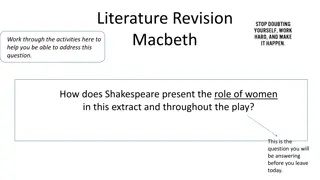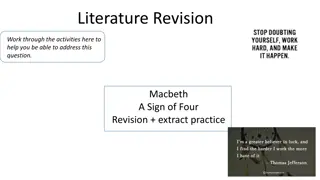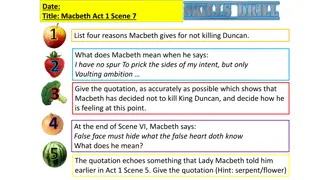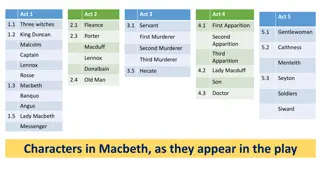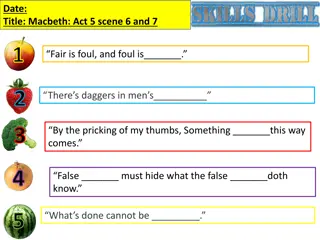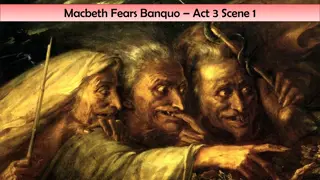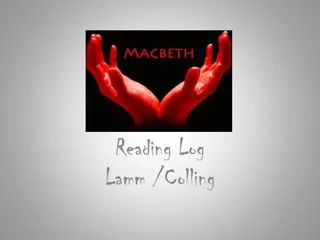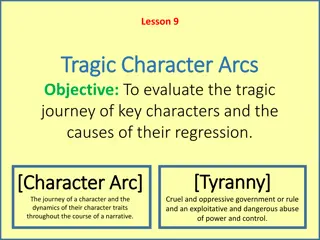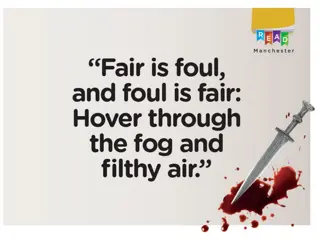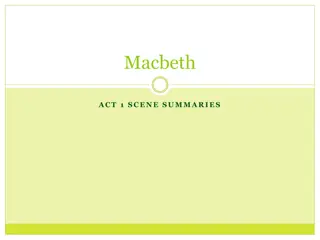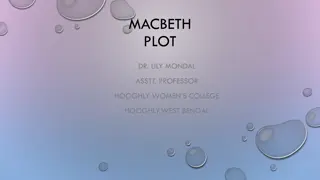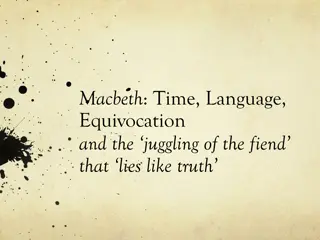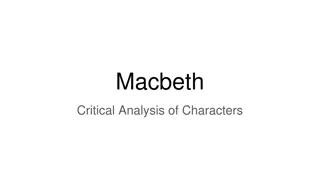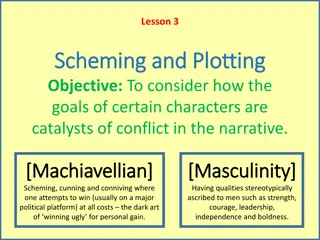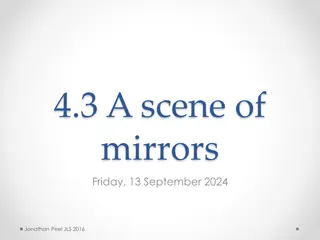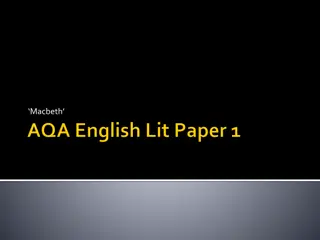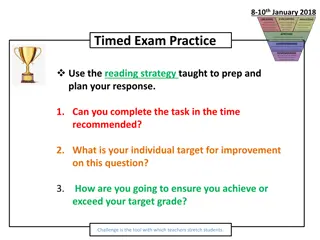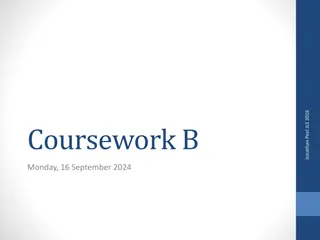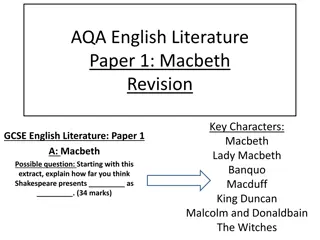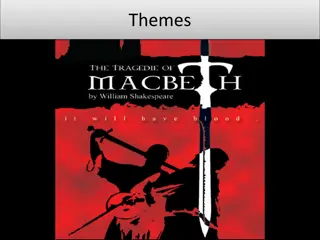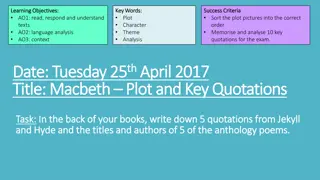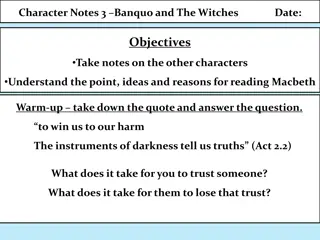Explore Themes of Ambition and Fate in Macbeth
Delve into the key themes of ambition and fate in Shakespeare's play Macbeth. Discover how ambition drives Macbeth and Lady Macbeth to their downfall, while the concept of fate influences their choices. Uncover Shakespeare's cautionary message about the dangers of unchecked ambition and the role of supernatural forces in shaping destiny.
Download Presentation

Please find below an Image/Link to download the presentation.
The content on the website is provided AS IS for your information and personal use only. It may not be sold, licensed, or shared on other websites without obtaining consent from the author. Download presentation by click this link. If you encounter any issues during the download, it is possible that the publisher has removed the file from their server.
E N D
Presentation Transcript
What are the key themes? In your books mind map with lots of space (across a double page) what you think the main themes are. Hint: Use the room and your PLC
What is ambition? NOUN 1.a strong desire to do or achieve something: 2.desire and determination to achieve success:
Ambition Who is ambitious in the play? In what ways? What happens to them? What is Shakespeare s message or warning about too much ambition?
Ambition Key Notes Macbeth is a play about ambition run amok. The weird sisters' prophecies spur both Macbeth and Lady Macbeth to try to fulfil their ambitions, but the witches never make Macbeth or his wife do anything. Macbeth and his wife act on their own to fulfil their deepest desires. Macbeth, a good general and, by all accounts before the action of the play, a good man, allows his ambition to overwhelm him and becomes a murdering, paranoid maniac. Lady Macbeth, once she begins to put into actions the once-hidden thoughts of her mind, is crushed by guilt.
Ambition Key notes continued Both Macbeth and Lady Macbeth want to be great and powerful, and sacrifice their morals to achieve that goal. By contrasting these two characters with others in the play, such as Banquo, Duncan, and Macduff, who also want to be great leaders but refuse to allow ambition to come before honour, Macbeth shows how naked ambition, freed from any sort of moral or social conscience, ultimately takes over every other characteristic of a person. Unchecked ambition, Macbeth suggests, can never be fulfilled, and therefore quickly grows into a monster that will destroy anyone who gives into it.
What is Fate? Noun. The development of events outside a person's control, regarded as predetermined by a supernatural power.
Fate How is fate demonstrated in the play? Which characters are involved? What is Macbeth's initial response to the weird sisters' prophesy? Does his attitude change at some point? If so, when does the change occur? Macbeth is repeatedly described as giving the witches his "rapt" attention. Why is that? What does this suggest about Macbeth's choices? Do all of the witches' prophesies come true? What role does Lady Macbeth play in her husband's actions? Is she always involved in Macbeth's decision making?
Fate and the Witches The Witches predict that Macbeth will become king. Ross arrives shortly after to announce that Macbeth has been given the title of Thane of Cawdor. The Witches may have overheard the news before, or it may just have been coincidence. As a result, however, Macbeth believes the Witches and can t stop thinking about being king. He does become king, just as the prophecy stated, but the Witches didn t tell him he had to kill King Duncan first. He chooses to do that himself. When Macbeth meets the Witches for the first time on the heath, they say: First Witch All hail, Macbeth, hail to thee, Thane of Glamis. Second Witch All hail Macbeth, hail to thee, Thane of Cawdor. Third Witch All hail Macbeth, that shalt be king hereafter. Act 1 Scene 3
Macbeth Cheating Fate Macbeth tries to cheat fate by killing Banquo. The Witches predict that Banquo s children will be the future kings. Macbeth feels cheated. He has damned himself for someone else s children. He wants to believe in fate when the predictions suit him, but he decides that he can cheat fate when it s something that he doesn t like! He manages to have his friend assassinated, but unfortunately for Macbeth, Fleance escapes. Macbeth decides that he will fight fate, rather than allow Banquo s children to be kings: Macbeth: Rather than so, come Fate into the list, And champion me to th utterance
What is the consequence of cheating fate Hecate (Queen of the witches) is disgusted at Macbeth s arrogance in trying to cheat fate and sets out to cruelly destroy him. Macbeth has meddled with black magic and as a final lesson Hecate enjoys teaching Macbeth that he can t cheat fate. This mirrors Banquo s advice in Act I Scene 3, that the Witches might hook Macbeth with initial promises then finally destroy him. She promises to put together a spell to confuse and trick Macbeth: Hecate: He shall spurn fate, scorn death, and bear His hopes 'bove wisdom, grace, and fear. And you all know, security Is mortals' chiefest enemy. Act 3 Scene 5
How does Hecate use fate to trick Macbeth? The Witches riddles make Macbeth believe that he is invincible, but in fact the Witches are talking about Macduff s fate. Macduff was born to destroy Macbeth. This is Hecate s joke. Hecate says: none of woman born Shall harm Macbeth. Act 4 Scene 1 Macbeth ignored the Witches warning to Beware Macduff. As fate will have it, Macduff is the one man who can destroy him. Macbeth dies as he has lived: violently. When Macbeth relates this warning to Macduff on the battlefield Macduff replies: Macduff Macduff was from his mother's womb Untimely ripped. Act 5 Scene 8
Appearance and Reality Main idea - People and things are not as they seem. Lady Macbeth: look like th innocent flower. Be the serpent under t Witches: Fair is foul and foul is fair What do these two quotations suggest about the difference between appearance and reality?
Key Notes A vs R The contrast between what is real and the appearance of something is used by Shakespeare. The classic dagger scene, when Macbeth is not sure if he can trust his eyes, is only one of many references to this theme. For instance, he sees Banquo's ghost at the banquet and Lady Macbeth imagines blood on her hands. The contrast between reality and appearance is also shown with all the references to thoughts, dreams and actions. Banquo talks about the 'cursed thoughts' he has had and his dreams of the witches. Macbeth talks of the world of thought and dreams and sometimes is stuck there. For instance, Lady Macbeth is critical of Macbeth's 'foolish thoughts' and talks of him being 'lost' because of this. Sleep is another theme associated with reality, because characters view it as vital to life, but like death or being in another world. Macbeth is told he has murdered sleep and will 'sleep no more' whilst Lady Macbeth thinks of sleep as death, calling it the sternest 'goodnight'.
Paradox A vs R From the opening
Key Quotations Go to your PLC. Create a key. Highlight the different quotations to show which theme they are. Quotations may fit into more than one theme.
Themes Video What else can you note down? http://www.bbc.co.uk/schools/gcsebitesize/e nglish_literature/dramamacbeth/macbeththe mesact.shtml


